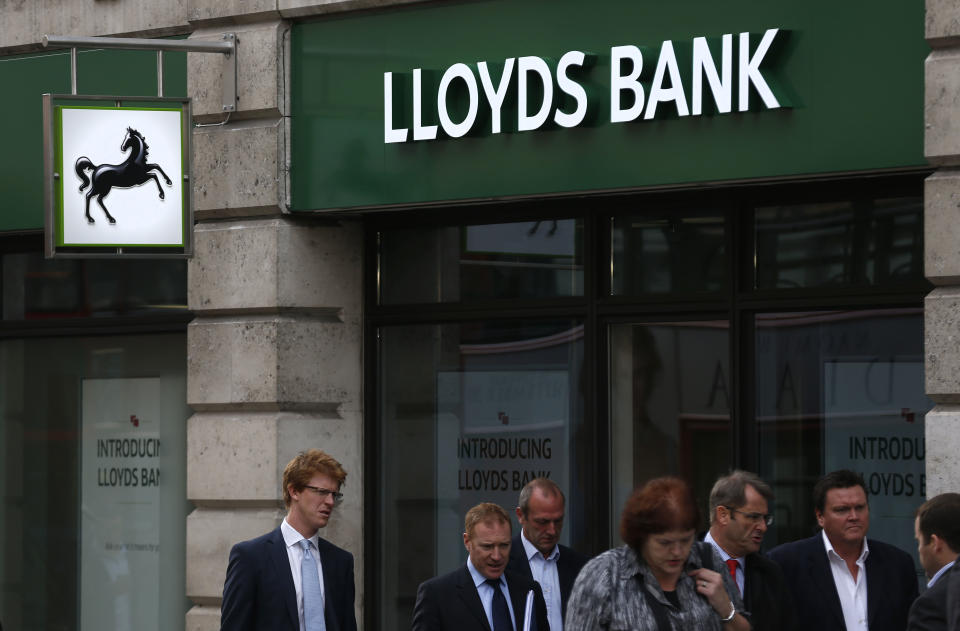Lloyds Bank, hit by new PPI charge, sees profits fall 7%

Lloyds Bank (LLOY.L) on Wednesday said that pre-tax profits in the first half of the year fell by 7% to £2.9bn, in part due to larger-than-expected £550m costs related to the payment protection insurance scandal.
Though underlying profits, which fell 1% to £4.2bn in the six months to the end of June, were slightly ahead of expectations, analysts had forecast that the bank would post pre-tax profits of £4.3bn, up from £3.1bn a year ago.
Revenue, which was down 2% to £8.8bn, similarly came in below expectations.
The £550m set aside in the second quarter for compensation to customers in the insurance scandal is also far larger than the £56m that had been forecast.
In total, the bank’s balance sheet was dented by £650m by the scandal in the first six months of the year.
It comes as the Financial Conduct Authority makes a final push to encourage people to seek compensation in the scandal, which saw the small print of some policies mean that customers could never actually make a claim.
Around 64 million payment protection insurance policies, which customers were told would help them repay debts in the event of illness or unemployment, have been sold in the UK.
By the end of 2018, Lloyds had spent £19.4bn in compensation, the largest of any UK bank.
The huge charge, the bank said, was driven by a “significant increase” in information requests related to compensation in the second quarter of the year.
It said the volume of information requests and complaints related to the scandal “remain uncertain”.
Shares in Lloyds were down almost 4% on Wednesday, to just under 53p, their lowest since early January.
CEO António Horta-Osório on Wednesday, however, pointed to the “robust” underlying profits posted by the bank, which were roughly in line with the previous year’s £4.2bn.
He also said that Lloyds would increase its interim dividend to shareholders.
But the weaker results come as part of a larger set of woes for the bank.
Several analysts have slashed earnings forecasts and downgraded the bank’s ratings in recent months — pointing to flat revenues and a rise in bad loans on its balance sheet.
Because almost all of Lloyds’ business is focused on the UK, its fortunes are also tied to the performance of the wider economy.
A slowing of the housing market and the threat of a no-deal Brexit are thus likely to be weighing on investor confidence.
“The economy has remained resilient although economic uncertainty has led to some softening in business confidence as well as in international economic indicators,” Horta-Osório said.
“In this environment our strategy continues to be the right one and we are well placed to support our customers and continue to help Britain prosper.”
The bank is also trying to offset a slowdown in consumer borrowing with a cost-cutting initiative.
Business as usual costs, the bank said on Wednesday, fell by 5% in the first half of the year. This “relentless focus on efficiency”, Horta-Osório noted, enabled increased strategic investment.
In January, the bank announced that it was axing almost 300 jobs as part of the restructuring.
At 55p on Tuesday, Lloyds shares had already been trading at close to their lowest level this year.
Shares in the company had rallied from December to April, reaching a 2019 high of 66p.
The results come after Sky News on Tuesday reported that Lloyds was in exclusive talks to buy Tesco Bank’s £3.7bn mortgage loan book.
Tesco Bank said in May that it was retreating from the mortgage market, citing tough conditions, and that it would sell its portfolio of mortgage loans.
Both Lloyds and Tesco (TSCO.L) declined to comment on the report.

 Yahoo Finance
Yahoo Finance 
